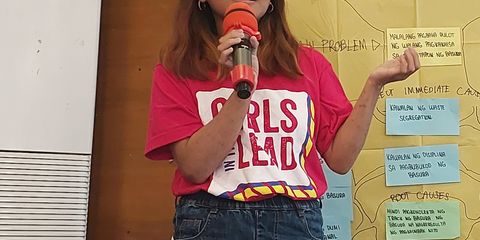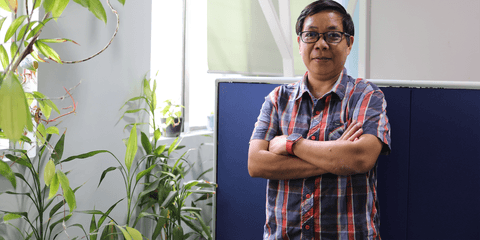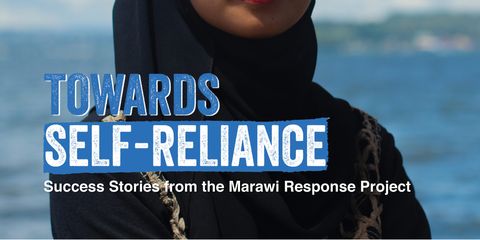Cash transfers support volcano and COVID-19 affected women
9 July 2020<strong>Maybelle, Judy Ann, and Sharlotte are among the women whose lives have been turned upside down by a volcano eruption and the COVID-19 pandemic. However, cash transfers are helping them get their lives back on track.</strong>
In January this year, Maybelle, Judy Ann, and Sharlotte survived the Taal Volcano eruption that spewed lava and a thick layer of ash across Batangas, placing the province under a state of calamity and displacing thousands of people.
More than 100,000 families were affected in the region, but just as they were starting to recover from the eruption, the global COVID-19 pandemic disrupted their lives once again, imposing extreme quarantine measures that have restricted the movements of all civilians.
Maybelle
Maybelle is 7-month-old pregnant and is worried about her upcoming delivery. A first-time mother at the age of 25, Maybelle is finding it difficult to travel outside her town to visit the nearest hospital. “With this quarantine, it’s tough to go out and travel to the nearby hospital. I need to see my doctor regularly for my pre-natal checkups,” she explains.
To help women like Maybelle, Plan International is providing unconditional cash transfers to more than 600 families and has distributed menstrual hygiene kits to 300 young women, including pregnant women and new mothers, in 3 communities in Batangas. Beneficiaries also receive text messages 3 times a week to help them stay updated on life-saving information about COVID-19.
Maybelle’s partner works abroad, and the volcanic eruption postponed their wedding which was due to happen earlier this year so now Maybelle is living with her parents. The cash transfer and menstrual hygiene kit she received has been a great help. “It is not easy to buy hand sanitiser and underwear because of the restrictions about going out. They are really helpful for us women,” she says.
Judy Ann
It has also been a difficult year for 21-year-old Judy Ann and her family. They struggled through the volcanic eruption and are now trying to survive the global pandemic. Their house, which was badly damaged by the powerful steam-driven explosion from Taal Volcano, remains unfixed.
“All of our properties were destroyed and are all over the place. We don’t have the money to rebuild our houses. Our family relies on relief goods and fishing. My brother and I have no work, and my mother is diabetic,” explains Judy Ann, who works at a factory that has a ‘no work, no pay’ policy.
Judy Ann was grateful to receive the cash assistance which she is using to pay for her mother’s medicine, among other daily necessities. She also received a menstrual hygiene kit. “My family and I were affected by Taal and your support is a great help, especially now that we have no work. We cannot buy these things anymore,” she says.
Sharlotte
Nineteen-year-old student Sharlotte is concerned about her education. Already disrupted by the volcano early this year which closed the schools, now the government has restricted classroom instruction to minimise the risk of infection.
“The impact of COVID-19 on my education is extremely frustrating. We already made sacrifices. We patiently waited and we worked hard to graduate this year but because of COVID-19, there are a lot of uncertainties.
“Sometimes, I cry in the middle of the night because the opportunities are no longer the same as what we hoped and worked hard for,” she says.
Sharlotte lives in Batangas with her 7 siblings and her father who is a fisherman. Her father’s source of income was affected after the volcano erupted and their house was partially damaged. But she remains hopeful and believes that organisations like Plan International will help them get back on their feet.
“This type of support is helpful in times during a crisis. Girls have specific needs that have to be addressed. Sometimes, because of the restrictions caused by COVID-19, girls needs are overlooked or not properly dealt with. Menstrual hygiene is a big thing for girls,” she says.
Plan International was able to distribute unconditional cash grants to 624 families in communities in Batangas with the financial support of the Spanish Agency for International Development Cooperation. The Prudence Foundation complemented this with menstrual hygiene kits for 300 young women.
Emergencies, Cash and voucher assistance


